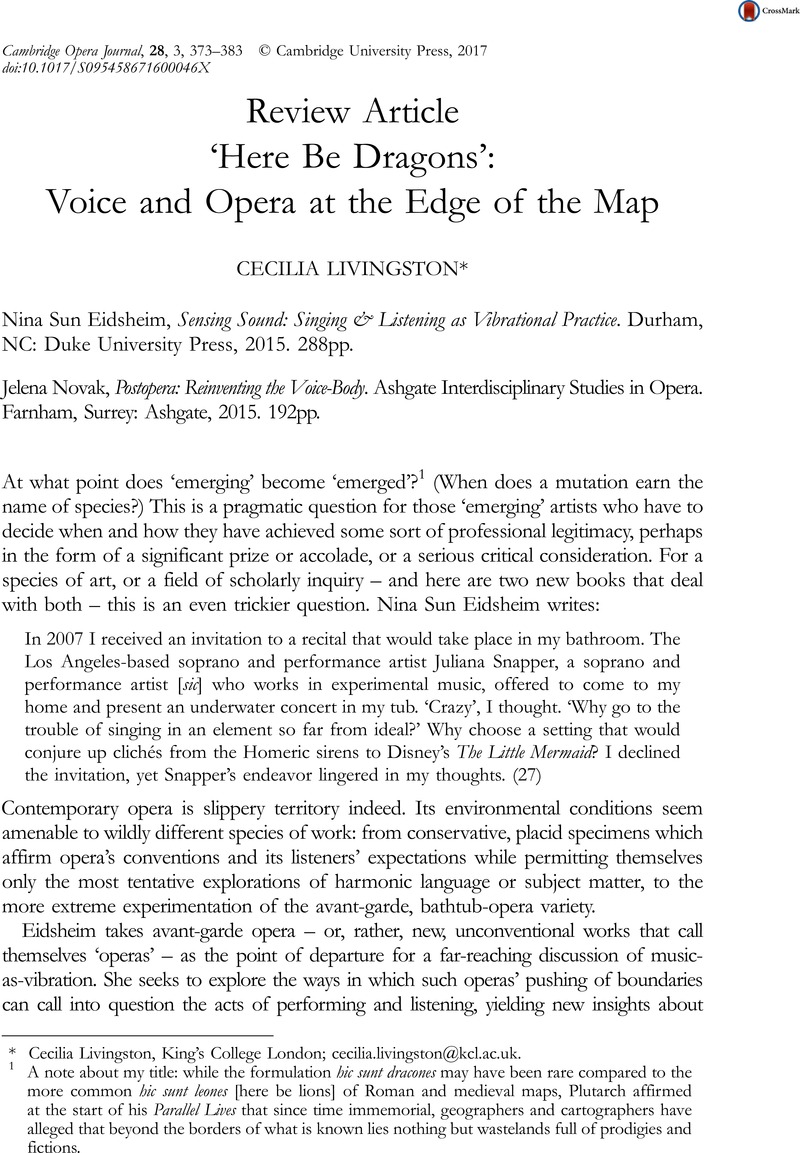No CrossRef data available.
Article contents
‘Here Be Dragons’: Voice and Opera at the Edge of the Map
Published online by Cambridge University Press: 20 March 2017
Abstract

- Type
- Review Articles
- Information
- Copyright
- © Cambridge University Press 2017
Footnotes
Cecilia Livingston, King’s College London; cecilia.livingston@kcl.ac.uk.
References
1 A note about my title: while the formulation hic sunt dracones may have been rare compared to the more common hic sunt leones [here be lions] of Roman and medieval maps, Plutarch affirmed at the start of his Parallel Lives that since time immemorial, geographers and cartographers have alleged that beyond the borders of what is known lies nothing but wastelands full of prodigies and fictions.
2 Christopher Cerrone ‘Invisible Cities’, www.christophercerrone.com/invisible-cities (accessed 20 May 2016).
3 Italo Calvino, Invisible Cities, trans. William Weaver (New York, 1974), 50.
4 Calvino, Invisible Cities, 165.
5 Novak, Jelena, Opera u doba medija [Opera in the Age of Media] (Novi Said, Sremski Karlovci, 2007)Google Scholar.
6 H. Marshall Leicester, review of Opera and the Culture of Fascism by Jeremy Tambling, Cambridge Opera Journal 10 (1998), 111–26; Joe K. Law, review of Opera and the Culture of Fascism by Jeremy Tambling, Opera Quarterly 14 (1997), 101–5.
7 Novak quotes from Duncan, Michelle, ‘The Operatic Scandal of the Singing Body: Voice, Presence, Performativity’, Cambridge Opera Journal 16 (2004), 298 CrossRefGoogle Scholar.
8 Heile, Björn, ‘Recent Approaches to Experimental Music Theatre and Contemporary Opera’, Music and Letters 87 (2006), 72–73 CrossRefGoogle Scholar. In his own footnote, Heile makes a special note of the very article by Michelle Duncan (‘The Operatic Scandal of the Singing Body: Voice, Presence, Performativity’) cited in Novak’s discussion of ‘pedigreed discourses’.
9 Heile, ‘Recent Approaches’, 73.
10 For instance, there is twentieth-century music’s recent special issue on voice (2016); the forthcoming Oxford Handbook of Voice Studies, ed. Nina Sun Eidsheim and Katherine Meizel; the ‘Why Voice Now’ panel at the Annual Meeting of the American Musicological Society in 2014, and subsequent colloquy (moderated by Martha Feldman) in the Journal of the American Musicological Society 68 (2015), 653–85.
11 Abbate, Carolyn and Parker, Roger, A History of Opera, revised edn (New York, 2015), 559–560 Google Scholar.
12 Mark Adamo, ‘For You, O Undergraduate Soprano: A look at new opera in America’, 21cm.org. DePauw School of Music, 7 April 2016 (accessed 23 April 2016).




